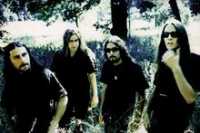Founded in 1990 in Sweden by vocalist and guitarist Mikael Akerfeldt, Opeth specialized in fusing progressive-rock, folk music, and heavy-metal. Orchid (Candlelight, 1995) cast Akerfeldt's death-metal growling and Peter Lindgren's epically distorted guitar in roles (mid-tempo interludes, acoustic melodies, long and tortured songs) that were not traditionally associated to heavy metal, despite sounding like heavy metal.
Morningrise (Candlelight, 1996), their masterpiece, refined that manner, particularly in the monumental suite Black Rose Immortal.
My Arms Your Hearse (Candlelight, 1998), featuring the new rhythm section of drummer Martin Lopez and bassist Martin Mendez, sounded both more aggressive and more traditional. It featured some of their most brutal compositions (April Ethereal, Demon Of The Fall).
Still Life (Peaceville, 1999) placated the rage and indulged again in sophisticated arrangements and dynamics, particularly in the 11-minute The Moor, the atmospheric Moonlapse Vertigo, and the majestic Face of Melinda.
Blackwater Park (Music for Nations, 2001) added Blackwater Park, Bleak, The Drapery Falls to their canon, and reached a broader audience.
Deliverance (Music For Nations, 2002) summed up their art and technique. Wreath, a majestic eleven-minute gothic fantasia that proceeds from agonizing doom-metal to fast hard-rock and to quasi-grindcore, By The Pain I See In Others, a violent and theatrical ten-minute melodrama with a solemn guitar solo and a desperate vocal refrain in between bursts of madness, and especially Deliverance, a 13-minute tour de force of different (but smoothly amalgamated) dramatic forms that runs towards a catastrophic climax, increase the level of musical and emotional complexity; while the suspenseful and melodic ten-minute ballad A Fair Judgment represents the romantic zenith of the album. Master's Apprentice offers a more conventional death-metal nightmare (but the second half changes personality twice).
Opeth mellowed down a lot on the symphonic Damnation (Music for Nations, 2003), an album heavy on the electronic keyboards and made of relatively shorter songs. Tracks: Window Payne, In my Time of Need, which is probably the standout, Death whispered a lullaby, Closure, Hope Leaves, To Rid the Disease, Ending Credits (Instrumental), Weakness.
Ghost Reveries (Roadrunner, 2005) is a keyboards-heavy album that does not change the equation as much as it first appears to. The hyper-romantic Ghost of Perdition is simply more of the same formula that Opeth has been experimenting for six years. Pieces such as The Baying of the Hounds and Hours of Wealth are more "progressive" than usual, and perhaps the execution has reached a new level of craftmanship, but overall the album is devoid of real innovation or real emotion.
